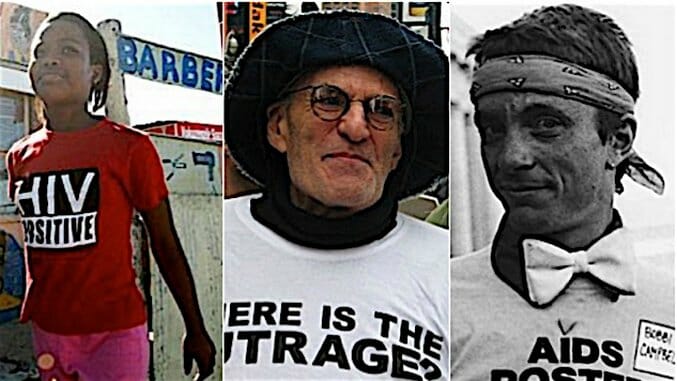
If you were too young to remember the hysteria surrounding the beginning of America’s AIDS epidemic in the early ’80s, imagine the 2014 Ebola scare, magnify it by a million, and throw in a big fat dose of homophobia. In these days of rampant “other-izing,” it’s worth revisiting those days, which showed that destructive mindset at its worst.
1. We Were Here: The AIDS Years in San Francisco (2011)

Nominated for both an Emmy and an Independent Spirit Award, We Were Here follows the stories of five San Franciscans, four men and a woman, whose lives were upended when the “Gay Plague”—a terrifying unknown—swept through the area in the early ’80s, devastating a vibrant community. The five became, in a sense, resistance fighters, and filmmakers David Weissman and Bill Weber both humanize the disease through their personal stories and explore the larger issues of how society can and should respond to a human catastrophe. Thirty years after the fact, We Were Here serves both as a cautionary tale for future catastrophes, and as history lesson for Americans too young to remember this one as it happened. —Allison Gorman
2. How to Survive a Plague (2012)

First-time filmmaker David France has assembled a superb record of the decade-long fight for a viable treatment protocol and an intimate portrait of the personalities leading the charge. January 1981 marked the first known AIDS death; there were 41 cases that year. A half-dozen years later, when How to Survive a Plague picks up with the formation of activist AIDS group ACT UP, the virus had claimed 500,000 lives worldwide. By the time this story ends in 1996 with the development of a combination drug therapy that actually works, 8.2 million people had died. AIDS is not the death sentence it was in the ’90s. Still, not all those infected can afford them, rendering France’s film at once a fascinating history and a compelling call to action. —Annlee Ellingson
3. Fire in the Blood (2012)

Narrated by William Hurt, Fire in the Blood paints a damning portrait of how government corruption and corporate greed resulted in the deaths of tens of millions of people in developing countries. Filmmaker Dylan Mohan Gray asserts that beginning in 1996, Western pharmaceutical companies as well as the governments of many countries in Africa and on other southern continents prevented low-cost AIDS medicines from reaching the people who needed them. It took the combined efforts of global figures like Bill Clinton and Desmond Tutu, as well as lesser-known ones such as Columbia University economist Joseph Stiglitz, to turn the tide on the AIDS epidemic. Ultimately Gray’s film gives us hope that individual good can overcome institutionalized evil. —Allison Gorman
4. United in Anger: A History of ACT UP (2012)

Like We Were Here and How to Survive a Plague, United in Anger documents the early battle against the AIDS epidemic as experienced by the gay community that was boots on the ground, trying to survive a disease medical science didn’t yet understand while also fighting pervasive fear, prejudice and religious animosity. Producers Sarah Schulman and Jim Hubbard use archival footage as well as interviews with some original members of ACT UP, which organized in 1987 to try to drive action by the government and the medical industry through civil disobedience. New York Times critic Jeannette Catsoulis called United in Anger “as scrappy and passionate as the actions it documents.” —Allison Gorman
5. Memories of a Penitent Heart (2016)

An outlier among AIDS documentaries, Memories of a Penitent Heart doesn’t directly take on the more obvious and inflammatory themes surrounding its subject, like sexual politics, Big Pharma and government apathy. Instead, it dives deep into the history of a single family touched by AIDS—that of the filmmaker, Cecilia Aldarondo, whose Uncle Miguel died of the disease—and into the complicated spiritual life of Miguel’s former partner, Robert, who disappeared after Miguel’s death only to resurface years later as Father Aquin, a Franciscan monk. Memories premiered at the 2016 Tribeca Film Festival and won Best Documentary at the Austin Gay and Lesbian International Film Festival. —Allison Gorman